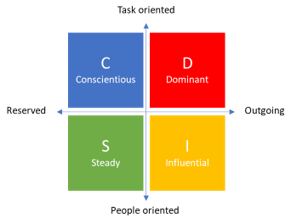 If you are new to the idea of Team Praxis, please read our introduction to the concept before using the table below to improve your communications with team members, stakeholders and anyone else involved in your project, programme or portfolio.
If you are new to the idea of Team Praxis, please read our introduction to the concept before using the table below to improve your communications with team members, stakeholders and anyone else involved in your project, programme or portfolio.
Different people's interpersonal skills would be perceived in different ways by others:
 Concientious behaviour would typically be perceived as: Concientious behaviour would typically be perceived as:
-
self-contained and non-assertive; -
serious and logical in their dealing with other people; -
focused on the details, process and task and doing things right rather than concerned with the implications of the relationship; -
applying logic, process and formalised structures to interpersonal challenges; -
using preparation and logic as a means of influencing people; -
providing a low supportive, low directive form of leadership through delegation; -
when under stress or in a conflict situation may withdraw, be resistant to change and slow to act. |  Dominant behaviour would typically be perceived as: Dominant behaviour would typically be perceived as:
-
self-confident and self-contained; -
direct and cool in their dealings with other people; -
focused on the task, results and achieving the goal rather than the relationship; -
using authority as a means of influencing people; -
providing a low supportive, high directive form of leadership through a telling style; -
when under stress or in a conflict situation may dictate and appear restless, critical and pushy. |
 Steady behaviour would typically be perceived as: Steady behaviour would typically be perceived as:
-
open and non-assertive; -
warm and supportive when working with others and in teams; -
focusing on building trust and getting acquainted rather than on the task in particular when challenges arise; -
conciliatory and accommodating of others' needs and perspectives; -
providing support as their preferred way of gaining influence over people; -
providing a high supportive, low directive form of leadership through a participative style; -
when under stress or in a conflict situation may submit and appear passive , hesitant and defensive. |  Influential behaviour would typically be perceived as: Influential behaviour would typically be perceived as:
-
open and assertive; -
spontaneous and enthusiastic in their dealings with other people, in particular with teams; -
focusing on interaction, the dynamics of relationships rather than the task; -
informal and unstructured in their dealings with people; -
using control as a means of influencing people; -
providing a high supportive, high directive form of leadership through a selling style; -
when under stress or in a conflict situation may become confrontational and appear over eager, inconsistent and unrealistic. |
Thanks to Donnie MacNicol of Team Animation for providing this page.
 If you are new to the idea of Team Praxis, please read our introduction to the concept before using the table below to improve your communications with team members, stakeholders and anyone else involved in your project, programme or portfolio.
If you are new to the idea of Team Praxis, please read our introduction to the concept before using the table below to improve your communications with team members, stakeholders and anyone else involved in your project, programme or portfolio.
 Concientious behaviour would typically be perceived as:
Concientious behaviour would typically be perceived as: Dominant behaviour would typically be perceived as:
Dominant behaviour would typically be perceived as: Steady behaviour would typically be perceived as:
Steady behaviour would typically be perceived as: Influential behaviour would typically be perceived as:
Influential behaviour would typically be perceived as:



